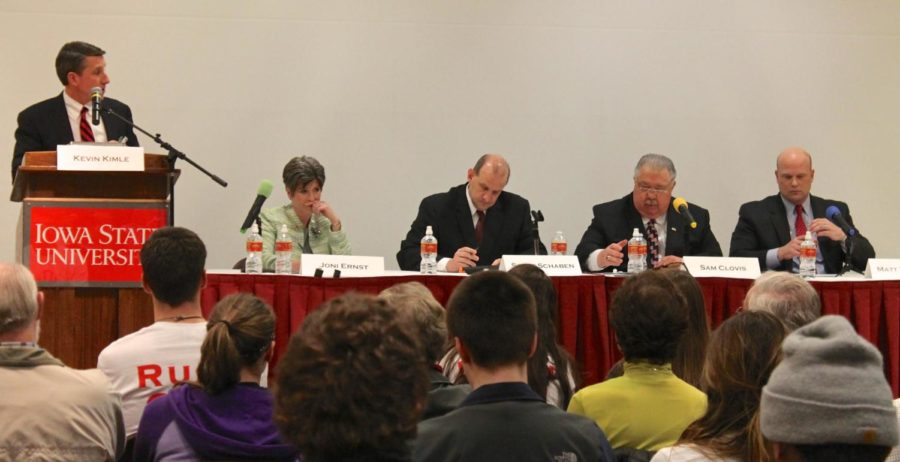Republican Senate meets with students
Richard Martinez / Iowa State Daily
As part of the Campaign 2014 Series, the ISU College Republicans provided a forum to connect voters to candidates running for a senatorial seat in the June primary elections. The candidates included Joni Ernst, left, Scott Schaben, Sam Clovis and Matt Whitaker. Each presented highlights into their respective platforms and responded to a series of questions from both the moderator and the audience.
April 3, 2014
Iowa State University’s College Republicans held a senatorial forum for the upcoming republican primary to be held on June 3. The four candidates in attendance were Sam Clovis, Joni Ernst, Scott Schaben and Matt Whitaker. Candidates who were not able to attend included Mark Jacobs, who stated that he had a primary engagement.
Having this forum take place on campus highlights the desire of the candidates to appeal to the youngest voting demographic of voters. Jonathan Laudner, President of the College Republicans, expressed why the group feels these events are important to the student body.
“Senate candidates are elected on six year terms, so it affects students not only while we are students, but also as we get into the workforce, get married, and start our lives. The long tenure of a Senator has a long effect, so it’s important to know who you are voting for,” Laudner said.
Laudner felt that the event was a success and is glad that students who attended got an opportunity to have their questions posed to the candidates.
“The candidates responded very well and were very informative to the questions because they understand that the questions reflected the most impactful issues on the minds of college aged voters,” Laudner said.
There were four questions posed to the panel of candidates which involved the government’s role in making college more affordable and worthwhile. Sam Clovis, a professor at Morningside College, said that federal assistance in sending students to school can often do more harm than good.
“Every time the federal government gets involved in ‘helping’ the students get money for school, the university increases tuition in turn,” Clovis said.
Clovis’ counterparts largely agreed with the sentiment that the federal government does not have a place in sending students to college by granting loans. Clovis also mentioned that a one-size-fits-all approach to sending people to college assumes too much, saying that sometimes it simply is not economically responsible.
The candidates were also asked about their feelings on the Affordable Care Act and government’s role in health insurance. Matt Whitaker proposes a return to free market principles in healthcare.
“Health insurance should be personal, affordable, and permanent. I would like to encourage transparency in medical pricing,” Whitaker said. “That way you don’t need to shop around for pricing, there is only one price. I do not believe that an omnibus, one-size-fits-all health care plan is the answer America needs.”
The other candidates reflected similar opinions concerning free market alternatives to the Affordable Care Act and called for it to be repealed and defunded.
The third question posed concerned the candidate’s opinions on social security and its long term sustainability. Joni Ernst believes that keeping the system viable for those currently drawing from it is a primary concern, but called for reform for future generations, including her own.
“We have to keep the promise that we made to our senior citizens and those approaching retirement. The current system is absolutely unsustainable,” Ernst said. “We need a system that cannot be raided by our federal government. The way the system exists now, I’ve never thought that the system will be there for me.”
Her colleagues were equally unenthusiastic about the prospects of having the system be of use for them when they become eligible.
The final question was about the candidate’s thoughts on how the United States should deal with the possibility of Iranian nuclear proliferation. Scott Schaben’s opinion stood out in that he believes geopolitical balance is the most difficult situation to approach and is not necessarily the responsibility of the Senate.
“U.S. Senators do not dictate foreign policy. Nobody on this stage has attended an intelligence briefing on Iran, so to speak about it is somewhat a difficult subject. You have to have somebody that is willing to look at every aspect of the global situation,” Schaben said.
The other three candidates all believed in more ‘kinetic’ solutions to such situations. They also spoke about their feelings of disappointment with what they perceive as the current administration’s weakness in regards to foreign policy.
The event’s main goal was to boost awareness of the upcoming primary election and to increase voter turnout in June. Iowa State University Professor Steffen Schmidt, political science, answered questions about the difficulty in getting voters to show for primary elections.
“There are so many running and voters don’t care about primaries. Only the hardcore party activists turn out in significant numbers. Voters will end up picking on personality and personal friendship,” Schmidt said.
The College Republicans say they have plans to invite the candidates to campus to speak with students several more times to increase student awareness.

















